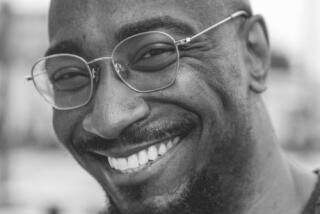Review: Björk’s ‘Utopia’ is a forbidding album about self-care
- Share via
For Björk, and for her listeners, Utopia is not easily reached.
On her new album by that optimistic title, the adventurous Icelandic singer envisions a realm of romantic promise and civic cooperation — an untainted land with “bird species never seen or heard before” and with “the first flute carved from the first fauna,” as she vividly describes it in the album’s airy title track.
But “Utopia,” due Friday, comes only after the torment and desperation Björk outlined on her last record, 2015’s “Vulnicura,” which examined in brutal detail the end of her lengthy relationship with artist Matthew Barney.
The price of admission to this place of emotional clarity, in other words, is her own pain, not to mention the political turmoil embodied by Donald Trump, whose election last year, she’s said, created an urgent need for positive thinking.
It’s a process replicated by “Utopia” itself, as forbidding a record as any Björk has made, at least on first approach.
Longtime fans know it’s been years since the singer was drawn to danceable beats and catchy pop tunes; 2007’s “Volta” is the last album she released with even a trace of the club-kid sensibility that made her a left-field pop star in the early 1990s.
But even by the thorny, densely composed standards of her more recent work (including “Vulnicura” and 2011’s “Biophilia”), “Utopia” feels difficult to access; the skittering electronic percussion rarely establishes a regular rhythm, while Björk’s vocal melodies seem to meander almost arbitrarily.
Listen to the album three or four times and you might wonder, even the fourth time, if you’ve ever heard these songs before.
Keep listening, though — keep putting in the effort of your attention — and “Utopia” slowly reveals itself.
What’s waiting to be found is perhaps best understood as an extended piece of theater music, with Björk dramatizing her recovery from trauma against complicated arrangements that don’t offer hooks or grooves so much as they do a safe sonic environment for her to express herself.
As she did for “Vulnicura,” the singer worked with Venezuelan producer Arca (who also backed her in a performance at July’s FYF Fest). But where last time they used strings to suggest an idea of suffocation, here they showcase the piping sound of the flute as played by a group of 12 women Björk put together in Reykjavik, Iceland.
The result, by definition, breathes, which leads your ear initially to hear Björk’s voice as just another wind instrument; her lyrics don’t jump out the way they did in early stuff like “Hyperballad” or “Possibly Maybe.”
But the words on “Utopia,” once they permeate your consciousness, are actually among her most intimate and affecting, whether she’s singing about rediscovering love (in part through a dating app) in “Blissing Me” and “Courtship” or working through her anxieties about how children are damaged by their parents’ actions in “Sue Me” and “Tabula Rasa.”
“I hope to give you the least amount of luggage,” she sings with touching pragmatism in the latter, “You’ve got the right to make your own fresh mistakes / And not repeat others’ failures.”
“Utopia” insists those mistakes are inevitable. But it also shows they can be survived.
♦ ♦ ♦ ♦ ♦ ♦ ♦ ♦ ♦ ♦
Björk
“Utopia”
One Little Indian
Twitter: @mikaelwood
ALSO
How Morrissey made the most of Morrissey Day
Tim McGraw and Faith Hill on their quietly subversive new album
How the American Music Awards tried to combat toxic masculinity
More to Read
The biggest entertainment stories
Get our big stories about Hollywood, film, television, music, arts, culture and more right in your inbox as soon as they publish.
You may occasionally receive promotional content from the Los Angeles Times.











